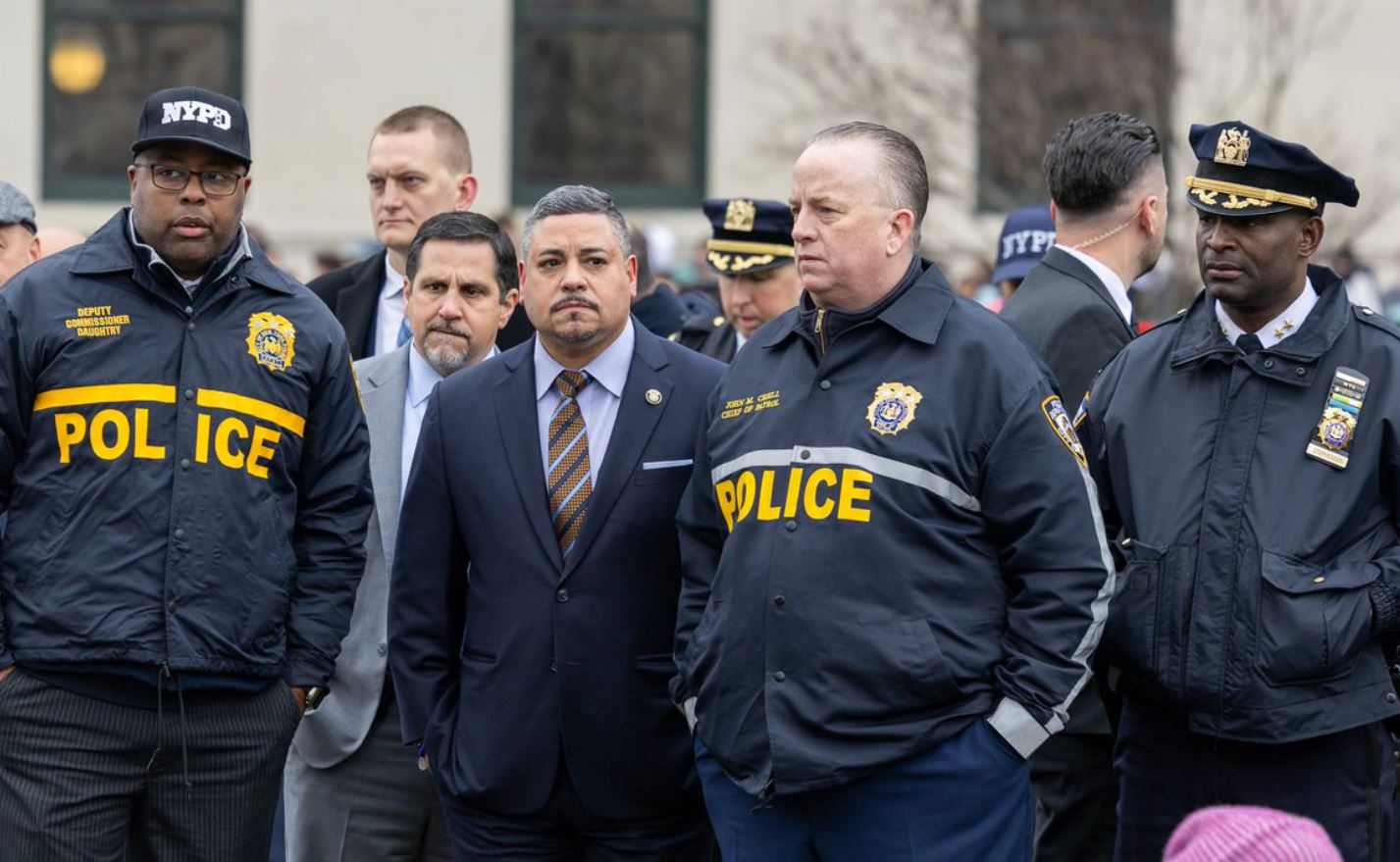What to Know
- NYPD Commissioner James O’Neill is expected to announce his departure Monday
- O'Neill has been at the helm of the NYPD since September 2016
- Chief of Detectives Dermot Shea is expected to replace O'Neill as commissioner
NYPD Commissioner James O’Neill will leave the department for the private sector, with Chief of Detectives Dermot Shea replacing him next month.
O'Neill, 61, became commissioner of the NYPD in September 2016, succeeding Bill Bratton. He leaves the NYPD with major crime reaching a record low for the first half of 2019.
In a City Hall news conference, De Blasio spoke warmly of O'Neill and said he would miss the commissioner personally. "I'm not hugging you," O'Neill responded to laughs. (De Blasio nonetheless leaned over and put an embrace around his shoulders.)
"He knows this department inside and out," de Blasio said. "He knows this city inside and out."
O'Neill's resignation goes into effect at the end of the month, with Shea taking the reins from him as sommissioner starting December 1.
The change comes amid controversial times for O'Neill. The commissioner was recently blasted by Police Benevolent Association President Pat Lynch for firing Daniel Pantaleo, the NYPD officer accused of using a banned chokehold that led to Eric Garner's death in 2014.
Lynch blasted the leadership of the city and police department for the August decision, and said O'Neill had "lost" the police department. In a statement Monday, he said he looked forward to working with Shea "to combat the current anti-police atmosphere."
O'Neill said Monday the firing wasn't a factor in his decision to leave. He felt this was the right time to leave, he said.
"This job comes with a lot. It comes with a lot of pressure," he added. "This is all I have thought about for the last 38 months - 24 hours a day, 7 days a week. It's all you think about, is keeping the people of this city safe, and it was an honor to serve."
The Sergeants Benevolent Association did not spare a kind word for O'Neill either on his departure.
"I believe he will go down as the worst Police Commissioner in NYPD history," SBA president Ed Mullins said in a statement Monday, later adding "Like any coward, Commissioner O'Neill chose to run off before the entire empire falls."
O'Neill, who spent his entire law enforcement career in New York City, also leaves the department in the middle of a mental health crisis among its ranks. Some 10 officers have died by suicide so far this year, seven of them since June.
The escalating crisis has prompted all levels of police leadership, including O'Neill himself, to speak out on the need for cops to take care of their mental health -- and to look out for the welfare of their colleagues.
FROM TRANSIT COP TO TOP COP
Local
A father of two sons and one of seven children himself, O'Neill grew up in Brookly's Flatbush neighborhood. He was appointed the 43rd police commissioner by Mayor de Blasio in September 2016. Prior to leading the department, he serviced as chief of department, the highest uniformed rank.
O'Neill began his law enforcement career in 1983 with the Transit Police, which at that time was an independent police department, and rose to the rank of lieutenant by the time the Transit Police merged with the NYPD in 1995. He continued moving up the ranks, eventually being promoted to captain and executive officer in the 52nd Precinct in the Bronx.
O’Neill also served as the commanding officer of the Central Park Precinct and the 44th Precinct in the western Bronx. He was the commanding officer of the 25th Precinct in eastern Harlem during the attacks of 9/11.
O’Neill was subsequently promoted to inspector and then to deputy chief.
In March 2014, he was appointed commanding officer of then-Police Commissioner William Bratton's office. O’Neill played a key role in the department's reengineering process and operational reforms. He was later promoted to chief of department in December 2014.
O’Neill inherited a number of challenges when he assumed the role of commissioner — crime statistics in the city had never been better, but officer morale was an issue, as was the level of distrust between officers and minorities.
He was at the helm of the department when a panel of criminal justice professionals recommended earlier this year year that the New York Police Department take steps to increase transparency and accountability in its officer disciplinary process.
O’Neill also welcomed a New York appeals court ruling in February that police body camera footage was subject to public disclosure under state law, saying the decision was “an important step forward for transparency.”
Since mid-October, NYPD officers have shot five people, killing four of them. In one case, an officer was shot at and saved by his bulletproof vest. In another, an officer was slammed in the head with a metal chair and spent several days in a medically induced coma.
At times during O'Neill's tenure as commissioner, it appeared he was caught between loyalty to his men and women in blue and the progressive policies embraced by his boss, de Blasio, and pushed by police reform advocates.
In one example, O'Neill said he wanted some changes to a state law that keeps police disciplinary records secret, so the department could share outcomes of cases with the public, but did not support a full repeal.
SHEA'S DEEP HISTORY
A 28-year veteran of the NYPD, Shea was promoted to Chief of Detectives on April 16, 2018.
In this role, he was tasked with overlooking a unified command for all investigatory operation in New York City. The Detective Bureau is responsible for the prevention, detection, and investigation of crime, and its work often complements the work of police officers assigned to the precincts.
Prior to serving as Chief of Detectives, Shea served as Chief of Crime Control Strategies. He also spent more than four years as Deputy Commissioner of Operations.
While serving as Chief of Crime Control Strategies, he was responsible for analyzing citywide crime trends and developing the department’s crime-control plans and procedures.
"Born and raised in Sunnyside, Dermot Shea is a New Yorker through and through. A 28-year veteran, he knows what it's like to walk a beat and lead a precinct. He helped build the strategies that have driven crime to record lows. He’s a proven change agent," De Blasio tweeted.
"As Commissioner, Chief Shea will focus on putting 21st century precision policing to work in order to deepen police-community bonds and end the scourge of gun and gang violence."
Shea said on Monday that over the last six years, the department has "redefined" how to police the city.
"We have done what many thought was impossible. We have pushed crime down. We have reduced incarceration."
De Blasio's sudden move to install Shea, the son of Irish immigrants, as O'Neill's replacement was not without criticism. Tina Luongo, of the Legal Aid Society, said there should have been an open, transparent process with input from city residents.
Under Shea, Luongo said, the police department has expanded its database of alleged gang members — often black and Hispanic men and women — and codified expansive DNA collection practices.
"This will be more of the same, and our clients — New Yorkers from communities of color — will continue to suffer more of the same from a police department that prioritizes arrests and summonses above all else," Luongo said in a statement.
Shea last year oversaw an overhaul of the special victims division, which deals with sex crimes, including the ouster of the chief in charge when Harvey Weinstein was arrested in 2018.



